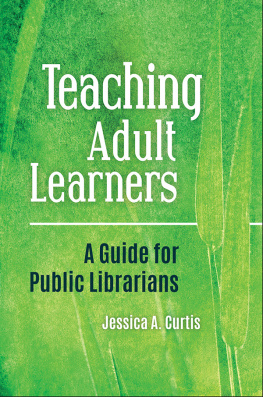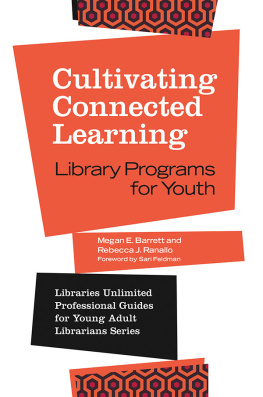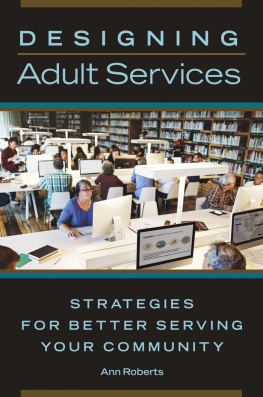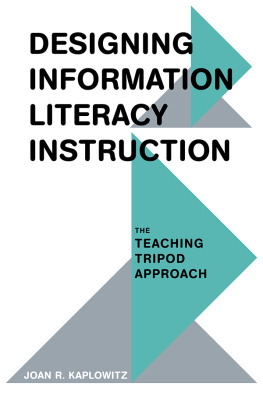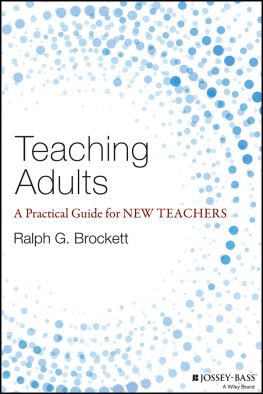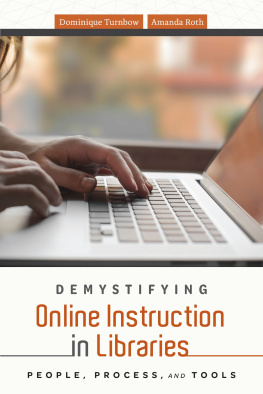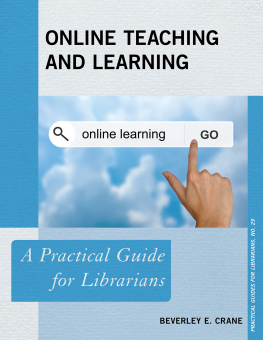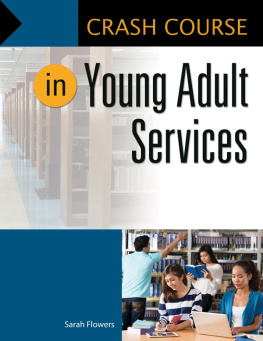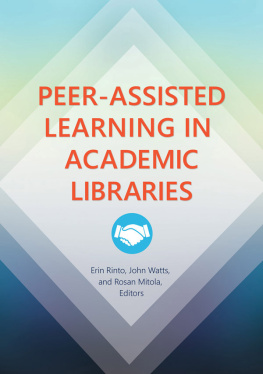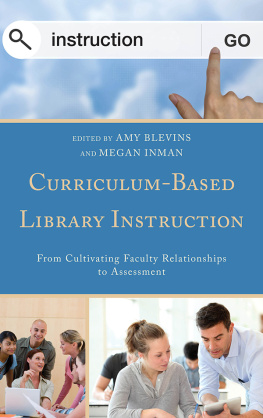Teaching Adult Learners
Teaching Adult Learners
A Guide for Public Librarians
Jessica A. Curtis

Copyright 2019 by Jessica A. Curtis
All rights reserved. No part of this publication may be reproduced, stored in a retrieval system, or transmitted, in any form or by any means, electronic, mechanical, photocopying, recording, or otherwise, except for the inclusion of brief quotations in a review, without prior permission in writing from the publisher.
Library of Congress Cataloging in Publication Control Number: 2019941120
ISBN:978-1-4408-6544-2 (paperback)
978-1-4408-6545-9 (ebook)
23 22 21 20 191 2 3 4 5
This book is also available as an eBook.
Libraries Unlimited
An Imprint of ABC-CLIO, LLC
ABC-CLIO, LLC
147 Castilian Drive
Santa Barbara, California 93117
www.abc-clio.com
This book is printed on acid-free paper 
Manufactured in the United States of America
Contents
Who dares to teach must never cease to learn.
John Cotton Dana (18561929), Respectfully Quoted: A Dictionary of Quotations (2010)
Learning can be defined as the purposeful or incidental acquiring of information and skills throughout a persons life that affects his or her life in a cognitive, emotional, and practical way (Jarvis 2018, 25). Why would a book about teaching start with a definition of learning? Because that is the entire point and the goal of all teaching: the people who are being taught learn. While learning is often associated with formal institutions and certain periods of life, public libraries are in the forefront of resources and have the capabilities to offer lifelong learning opportunities to adult populations. Librarians and library staff who have an understanding of how and why adults learn can utilize that knowledge to enhance every transaction, from the basic reference interview to formal classes and programs.
The past one hundred years have produced a quantity of valuable research and theories on how adults learn so that instructors can package and present information in a way that increases a persons ability to learn. In its application to the library world, the vast majority of research and literature focuses academic libraries. These works address the particular situations and needs of college students, often focusing on the rising population of nontraditional, or older, students on campus. Adult learning theory and practice as applied to public libraries suffers in comparison to academic libraries in terms of research, textbooks, and professional literature. This work addresses how public libraries can take an active role in learning opportunities for adults. Libraries and their staff can use these theories, practices, and suggestions to maximize library talent and resources to become a recognizable agency of education, assistance, and advocacy to the public.
Library science education has traditionally addressed the teaching aspect of adult reference, adult services, or other adult-oriented degree tracks in terms such as information literacy, user education, bibliographic instruction, and programming (ACRL 2016). Some accredited schools are starting to offer course work in instructional design, which is associated with the design, implementation, and evaluation of instructional material. Instructional design, at least in terms of library job titles and descriptions, still applies mainly to an academic setting where instructional design librarians work with faculty to create classes, learning strategies, and online content to connect students with resources in a systematic, practical application of design and learning principles. These same principles and practices are equally applicable in a public library setting, where librarians create guided material for library resources, pathfinders, and other publicly consumed information in addition to reference librarians at the desk, on the phone, virtually, or in classes and programs.
This work is partly a plea and a rationale for accredited library programs to automatically build basic learning theory and instructional design elements into any curriculum track that involves interaction with an adult audience. It is also a demonstration and guide for students and those already in the field of the many ways that librarians can successfully teach individuals in their communities.
Bibliography
Association of College and Research Libraries (ACRL). 2016. Library Instruction Courses Offered by Accredited Masters Programs in Library and Information Studies. Instruction Section Website. https://acrl.ala.org/IS/instruction-tools-resources-2/professional-development/library-instruction-courses-offered-by-accredited-masters-programs-in-library-and-information-studies/.
Jarvis, Peter. 2018. Learning to Be a Person in Society: Learning to Be Me. In Contemporary Theories of Learning: Learning Theorists in Their Own Words, edited by Knud Illeris. London: Routledge. ProQuest Ebook Central.
Library of Congress, ed. 2010. Respectfully Quoted: A Dictionary of Quotations. Mineola, NY: Dover Publications, 337.
One
The Growing Role and Impact of Instruction in Public Libraries
Any library staff who work with an adult population can attest to truth of the title of this chapter. There is an increase in the instructive role of public librarians. Not every moment of a reference or technical help interaction is a teaching moment, but it can be argued that most now are, and you want the customer to learn the information and instructions you give. Not only does it fulfill the goal of why they contacted the library but also it adds value to the library in the eyes of that person and the larger community, which is an important consideration in a time when many are questioning the value of physical libraries in a digital age.
U.S. libraries have served as a place for instruction and continuing education since the first private libraries appeared in the eighteenth century. Some of the first libraries centered on private collections that serviced specific populations, such as trade guilds or other special groups, and could be accessed by paying a subscription fee. These libraries not only contained materials that would benefit the group but also served as a congregation and dissemination point for knowledge and experience. Even in its infancy, the U.S. library system stimulated education and investigation that converged with a developing self-reliance and a sense of independence (Dawson 2008, 33).
Addressing the Digital Divide and Community Support
Economic disparity, the digital divide, and multiple other factors can put many people in the community at a disadvantage when it comes to how to accomplish now-basic online life tasks, such as paying bills, accessing account information, and navigating healthcare websites (Zickuhr and Smith 2012, 6). The digitization or computer-focused reality of communication and workforce functions also means that those seeking employment are at a disadvantage without basic technical skills and software knowledge. A study on the effect of digitalization in the workforce also shows that those with technical skills can earn more than the national average (Muro et al. 2017, 21). Public libraries are in a unique position to help people of all ages, economic status, and skill levels using library resources, classes and programming, and the ability of the staff to convey information and instruct.

